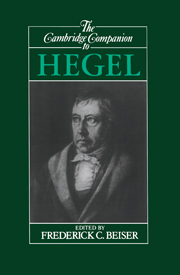Book contents
- Frontmatter
- Introduction
- 1 Hegel's intellectual development to 1807
- 2 You Can't Get There from Here
- 3 Hegel's conception of logic
- 4 Hegel's idealism
- 5 Hegel's dialectical method
- 6 Thought and being
- 7 Hegel's ethics
- 8 The basic context and structure of Hegel's Philosophy of Right
- 9 Hegel's historicism
- 10 Hegel on religion and philosophy
- 11 Hegel's aesthetics
- 12 Transformations of Hegelianism, 1805-1846
- 13 Hegel and Marxism
- 14 Hegel and analytic philosophy
- Bibliography
- Chronology
- Index
7 - Hegel's ethics
Published online by Cambridge University Press: 28 May 2006
- Frontmatter
- Introduction
- 1 Hegel's intellectual development to 1807
- 2 You Can't Get There from Here
- 3 Hegel's conception of logic
- 4 Hegel's idealism
- 5 Hegel's dialectical method
- 6 Thought and being
- 7 Hegel's ethics
- 8 The basic context and structure of Hegel's Philosophy of Right
- 9 Hegel's historicism
- 10 Hegel on religion and philosophy
- 11 Hegel's aesthetics
- 12 Transformations of Hegelianism, 1805-1846
- 13 Hegel and Marxism
- 14 Hegel and analytic philosophy
- Bibliography
- Chronology
- Index
Summary
BACKGROUND
Hegel's philosophy is an attempt to renew classical philosophy, especially the philosophy of Plato and Aristotle, within the modern philosophical tradition begun with Kant. Hegel's ethical thought is no different from the rest of his philosophy in this respect. Classical ethical theory, culminating for Hegel in the ethical theory of Aristotle, saw ethics as aiming at a single final end or human good, called “happiness” [eudaimonia). By nature, human beings have a characteristic function; to fulfill that function is to be happy. Aristotle defined happiness as the actualizing of the soul's capacities in accordance with the excellences appropriate to them, and most especially the actualization of its highest capacity, reason. Our rational excellences include both theory and practice; practical excellences include not only the intellectual virtue of practical wisdom but a range of distinct moral virtues of character. Moral virtues dispose the non-rational part of our soul, which includes desires and feelings, to be governed by the rational part, so that our wants, likes and dislikes, pleasures and pains, all harmonize with reason.
- Type
- Chapter
- Information
- The Cambridge Companion to Hegel , pp. 211 - 233Publisher: Cambridge University PressPrint publication year: 1993
- 17
- Cited by

